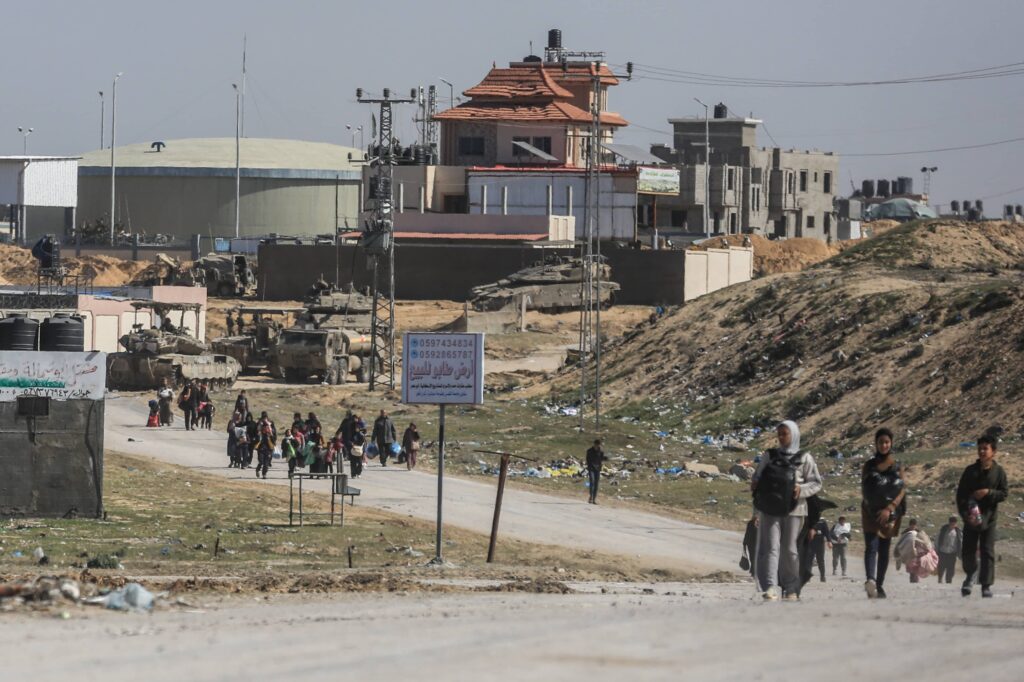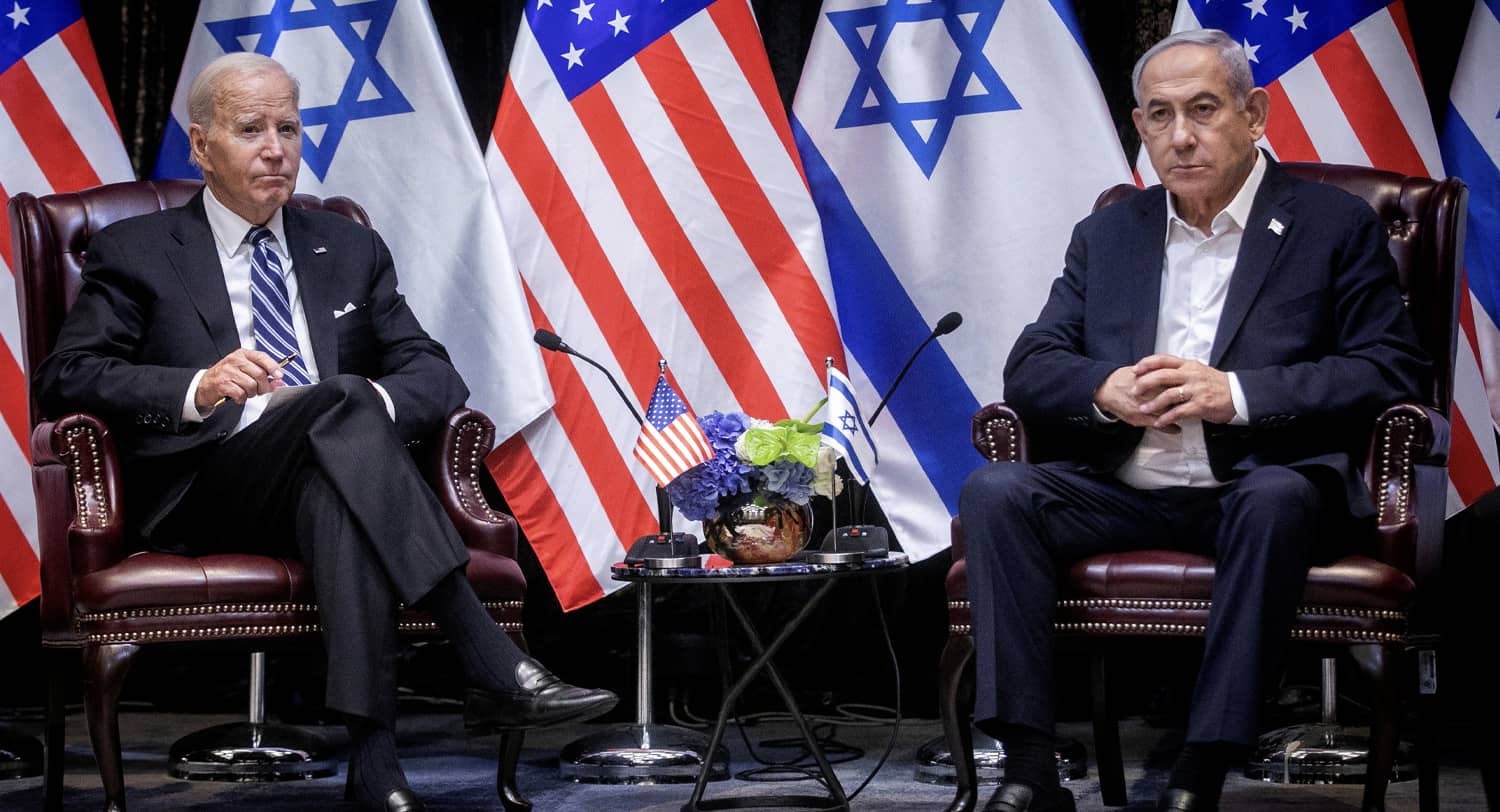Rarely in the American special relationship with Israel has there been such a dramatic display of discord between leaders. What began as a remarkable show of American support and solidarity with Israel, in the wake of Hamas’s assault in October, came by February and March to be increasingly marred by acrimony. The White House statement of March 18 left no doubt that the US will not support Israel’s plans for an attack on Rafah and that consultations are needed over alternative ways to bring down Hamas in the areas not yet under Israeli control.
>> Insight from Israel: Read more from Eran Lerman
For the first time ever, the US annual intelligence assessment speculated about the prospects that the present coalition in Israel may collapse due to public displeasure. For the first time ever, a US Senate Majority Leader – Chuck Schumer, presently the most senior Jewish political figure in America – called for an Israeli prime minister to be replaced. Meanwhile, the military establishments in both countries still work closely together, and will now try to cobble together a solution for the Rafah conundrum.
What Comes Next
Israel is preparing an assault on the last remaining areas still held by Hamas, particularly Rafah. Over one million internally displaced Gazans took refuge in the Rafah areas after Israel’s ground campaign began, at Israel’s request. They now need to be provided with a way to extricate themselves before Rafah becomes a battle zone.
Israel has given its word to Egypt that the Palestinians will not be pushed into Sinai and that the IDF will take control of the road on the Gaza side of the Egypt-Gaza border, in close coordination with Egypt. The question, which Israel has thus far failed to answer, remains as to where the refugees may be directed safely within the bounds of the Gaza Strip itself.
Given Israel’s failure to produce a humanitarian plan for the Gazan civilians now in Rafah, Biden and European leaders are publicly pressuring Israel to desist altogether from entering Rafah. Biden has offered the view that there are undefined “other ways” to be rid of Hamas without a massive ground assault. Probably he is referring to counter-terrorism strikes that, with the aid of US intelligence, could take out Hamas’s leadership in Gaza.
America’s undefined “other ways” to defeat Hamas is rejected not only in Netanyahu’s cabinet but also by a majority of Israelis, who are not prepared to leave Rafah in Hamas’s hands. That, they believe, is tantamount to a Hamas victory and defeat of Hamas remains the national goal, no matter how horrifying is the destruction that their war has brought upon their own people in Gaza. Given the achievements of the IDF in the Khan Yunis campaign, with its signs of disorder and demoralization of Hamas’ cadres and level of Israeli losses lower than expected, the Israeli leadership sees no reason to desist from making the final push.
Further time is needed, given Israel’s failure of advance planning for the humanitarian relief side of a Rafah operation. Hence the willingness in Israel to contemplate a significant pause in the context of a hostage deal.
For Netanyahu a pause is just that – a pause, not a ceasefire – putting off for a while, but not forever, the entry into Rafah. Yet in Washington there is hope that this pause will somehow morph into a permanent end to the war – and also, through “other ways,” into an end of Hamas rule in Gaza, opening up the prospects of broader conflict resolution. The gap between these expectations cannot be easily papered over. But as long as Israel’s supporters concede that Israel has a right to defeat Hamas, a way must be found to do so militarily while allaying the justified fears of civilian casualties in Rafah.

The Grand American Bargain
Meanwhile, intense American diplomatic efforts are apparently aimed at producing a grand design, supported by key Arab and European players. For instance, British Foreign Secretary David Cameron suggested that the time may come in the not too distant future for the recognition of a Palestinian state. The Biden administration has leaked elements of a comprehensive package to journalists like the New York Times’ Tom Friedman.
Planning for the recognition of a Palestinian state (i.e., allowing a vote at the Security Council making it a full-member state) – subject to benchmarks, including revitalization of the Palestinian Authority (presumably anti-corruption and de-militarization measures) and a de-radicalization program (possibly ending the PA’s payments to terrorists and their families.)
Bringing in Saudi Arabia to normalize relations with Israel in exchange for Israel’s promise of recognition of a Palestinian state. This would be accompanied by an American-Saudi agreement involving security guarantees and provision of civilian nuclear power capability.
Establishing a diplomatic solution to the situation in Lebanon, probably involving minor Israeli territorial concessions on the land border in return for the withdrawal of Hizbullah north of the Litani River.
Finally, using this presumed turn of events to consolidate a regional front against Iran, its proxies and its nuclear ambitions.
From an Israeli perspective, alluring as some aspects of this package may be, two major reservations stand out. First, any promise of recognition of a Palestinian state is perceived as a huge reward for October 7 terror, and as a genuine obstacle to any future negotiated agreement (why should the Palestinians offer Israel anything in return for what they already received from the international community?) Second, It opens up the prospect of recognition of Palestinian sovereignty right up to the June 1967 lines, including in Jerusalem, which no Israeli government would now accept (though in the year 2000 an Israeli cabinet led by Ehud Barak did accept something similar in the Clinton parameters.)
The Israeli Government Response
After months of avoiding any detailed discussion of postwar Gaza, the Netanyahu government took swift action in response to the American package. First the cabinet and then the Knesset approved a short declaratory resolution rejecting the idea of unilateral recognition of a Palestinian state. The vote in the Knesset was 99 to 9, with two opposition parties – Yair Lapid’s Yesh Atid and Avigdor Lieberman’s Israel Beitenu – joining the government.
Prime Minister Binyamin Netanyahu then issued a set of principles on “The Day After Hamas” (hastily put before the cabinet at midnight on 23 February).
Reiterating no unilateral recognition of a Palestinian state.
Confirming Israel’s war aims of destroying Hamas’s military and government, returning the hostages and de-militarizing Gaza.
Preventing smuggling across the border with Egypt, by re-establishing Israeli control of Gaza’s southern border, in cooperation with Egypt.
Placing future Gaza civilian administration and police in the hands of “local elements” who aren’t identified with terrorist organizations and who aren’t paid by foreign governments.
Promising a future de-radicalization plan for Gaza to be implemented with the involvement and help of Arab countries with experience in this area; UNRWA to be dismantled owing to its support for terrorism.
Timing of reconstruction to begin with de-radicalization, with the help of countries acceptable to Israel.
Israel’s reaction to the American grand bargain – which in Israeli eyes lacks realism – also took the form of a wish list, equally short of workable solutions. Now, as the US government takes unilateral steps to facilitate humanitarian aid to Gaza, bilateral tensions seem to have reached a critical juncture.
Ultimately, the Americans would like to see Israel put forward a workable design for postwar reconstruction and governance in Gaza. But the Israeli cabinet is split on this issue. With consultations at the ministerial level set to begin the week of March 25, the American-Israeli fireworks look set to continue through the spring.

